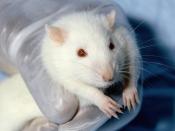Animal Rights Take the case of an incompetent human being and a mentally comparable non-human animal, both of which possess rights. The human's rights are respected via an agent or proxy in the event they cannot initiate proceedings on their own. A non-human animal's rights are demonstrated by agreement with anti-cruelty legislation and by the general social contract to avoid cruelty to animals. The argument would be that the rights of the incompetent human would weight heavier than those of the non-human animal. Such an ethical argument can be made if the inept human may benefit from testing on the non-human animal. For illustration purposes, take a renowned world leader who has contracted a debilitating illness. He or she has now gone from a viable, respectable contributing member of society to an incompetent human person. On the other end of the spectrum we have a non-human animal that if tested on the cure may be found for this incapacitating disease; through the testing the animals life may be endangered.
The life of the incompetent human weighs more heavily in this case. Humans have created the animals that would be tested on as tools. They are bred and cared for with the future intention of disposal. When it is said that humans create the animals, in the case of laboratory testing humans build the cages, feed, clean, and provide for their health and well being. If humans have created the animals they, in turn have the right to destroy them, especially if medical testing will benefit a human or several humans. All humans have a right to life and therefore by testing on animals in medical cases this right is preserved.
Human life is a precious commodity. Making the parallel between an incompetent human and a non-human animal, the general idea of humans being superior prevails. Although an incompetent human may not be able to initiate proceedings and enter into arguments without a proxy, the executor in charge of their well-being is always another human. Non-human animals need humans to speak on their behalf by way of legislation to ensure their rights. It is also instinctive to consider humans as the superior species; they have been on the top of the food chain since the creation of man. An animal as a source of food is a cultural universal that has been predominant in the world since the beginning of time. Naturally, humans are going to have the control when there is no other species higher than they are. In that, it is only natural that humans should prevail in a case of animal testing where the survival of a human is at risk.
Non-human animals should be held in and given the same respect as an incompetent human person. The idea that humans have created animals and therefore have the right to destroy or treat them in a way that is inconsistent with the treatment of incompetent human persons is objectionable. Doubt is raised in that incompetent humans and non-human animals should be considered in the same respect. Humans create other human beings, but they do not feel they have the right to destroy them because all humans have a right to life. Legislation actually prevents humans from threatening or taking the life of other human beings. For example, would it be permissible to raise humans, and then destroy them for the purpose of using their organs for transplants? No, that would not hold under the unwritten social contract that all humans are expected to abide by. A moral person would not agree to raising fifteen incompetent moral humans in cages and performing gruesome tests on them for the purpose of saving the life of one or more small-domesticated animals.
The point of view based on the position of the initiation of proceedings and the entry into arguments on behalf of a proxy for an inept human or a non-human animal is not a claim that can differentiate the two. It is because they both have interests that need to be protected. Just because a vast majority of humans are capable of these dealings does not make an incompetent human anymore mentally proficient. Animals and the incompetent human persons have the same amount of cognitive abilities; therefore, the argument is implausible.
The objection is prevalent because incompetent humans have no abilities that separate them from non-human animals. The initiation of proceedings and the entrance into arguments does not make a difference because in both instances they need a third party to enter for them. It does not matter that humans are the proxy for both. The lives of animals should be held in the same esteem as their mentally incompetent human peers. The arguments stated opposing the rights of animals have no real validity because the value of life, in any form, should be paramount.





